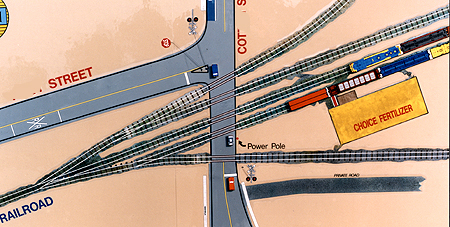
If so desired, each juror can hold the photograph and view it in
the perspective of the actual driver. In all vehicle collision cases :
the question is always "What did the driver(s) see?
In cases such as a head on collisions it is usually a straight forward view, thus the photographs needed can in most cases be done using
conventional photography methods. However, if the case involves turns, a T-bone collision, or line of sight left / right, then you will probably need to show a much wider area of drivers eye view.The images shown here are a good example of a case where we used this photographic method. The driver, with his four friends riding in the car, had pulled up to a railroad crossing involving five sets of tracks. When he pulled up to the first track and stopped; the building to the right was blocking his clear line of sight. When he pulled up to the second set of tracks and stopped the power pole blocked his clear line of sight.
Then he pulled up about 3 more feet to take a look and in than 1.5 seconds All five were dead.

This map of a railroad crossing was built to show a line of sight problem existing at a railroad crossing involving 5 sets of tracks. Note car nearest power pole. When the car pulled up to look and see what was coming the power pole blocked the drivers line of sight. When the driver pulled up a few more feet, the fertilizer building blocked his line of sight, actually giving him only about 50 feet of line of sight view. Now add that to the fact that the train signal bell located 360 feet down the track to the left was dinging, the driver assumed the train must be coming from that direction; he pulled out a couple of more feet and within about 1.5 seconds was dead.
The entire map built by ALPS is not shown.
The original map also showed the railroad bell signal 360 feet away.Let ALPS put you in the driver's seat with our
expert panoramic photography.
